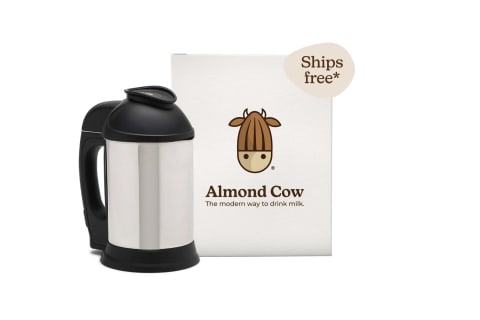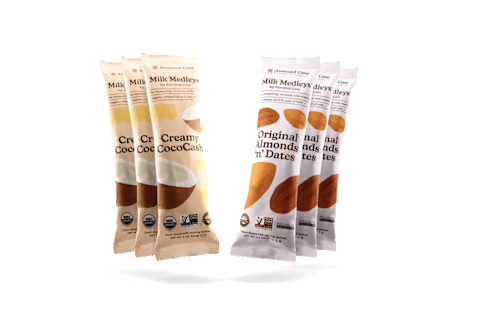Advertisement
Almond Cow Review: Is The Nut Milk Maker Worth $245?

My love affair with alternative milks started nearly a decade ago after I became obsessed with a few vegan food bloggers. Their recipes introduced me to oat milk—which was still relatively unknown at the time—and I soon discovered the small dairy-free section of my local grocery store.
A lot has changed since; I find my plant-based recipes on TikTok and that small dairy-free section is triple the size. Yet, I don't actually take advantage of my seemingly endless selection of dairy-free milks and creamers. Instead, I stock my fridge with fresh coconut, cashew, and almond milk from my Almond Cow Machine.
Designed to streamline the process of making dairy-free milk at home, the sleek device creates the perfect creamy concoction with minimal ingredients. You simply load up your preferred nut (or grains), add a sweetener or spice, and blend the ingredients for an undeniably smooth beverage.
Here's why I recommend the Almond Cow to everyone I know—dairy-free or not.
How does the Almond Cow work?
The Almond Cow is a countertop machine that allows you to blend the perfect alternative milk with minimal steps. The device uses a powerful blade to pulverize fresh nuts and grains into a pulp.
This pulp is combined with water to create a creamy blend, which is strained by the built-in metal filter basket. This keeps the pulp separated from the milk so you get a smooth consistency without any unwanted grit.
If you're wondering how such a simple process justifies the hefty price tag, it all comes down to the simplicity of the machine—and the benefits it brings.
From start to finish, the entire milk-making process takes less than five minutes with the Almond Cow, including the time spent measuring out ingredients. And whereas store-bought milk alternatives often have preservatives, sweeteners, and/or oils to get the rich, shelf-stable consistency, milks from the Almond Cow have as few (or as many) ingredients as you want.
While the milks only last about three to four days in the fridge due to the simple ingredient list, I've found it's a small price to pay for nut milks that actually taste like nuts.
Despite the name, the Almond Cow isn't limited to nut milks. I've previously repurposed the device as a mini mocktail maker, using the basket to blend fresh lime and jalapeño into a spicy sour mix.
The brand's recipe book also recommends testing out ingredients, like pea and corn, to expand your definition of alternative milks even further.
How to use the Almond Cow
Before using the Almond Cow, you have to decide whether you want to make a milk or a creamer. Depending on your end goal, you'll fill either the stainless steel canister or the smaller plastic collector cup (which sits inside of the canister) with water.
Both are included with your purchase, but the latter allows you to reduce the amount of water used by the machine. This provides an end result with a higher fat content for a creamier consistency—hence the "creamer" option.
The next step is measuring out nuts or grains to put into the filter basket; you'll need the same regardless of the liquid amount used. This is also when you'll need to decide how you want your milk to taste.
The brand recommends using either maple syrup or dates to naturally sweeten your beverage (I've even used agave before in a pinch), as well as a dash of salt to help enhance the flavor. I personally like incorporating vanilla extract, too, as it gives the final product just a bit of extra oomph.
When your filter basket is full, you twist it onto the bladed lid; all the blending and straining will happen within this piece.
Once you place the lid back onto the canister, you're ready to begin. Simply press the button on the lid to kick-start operation. The machine runs automatically for three 15-second cycles, blinking green for each new cycle.
Although the device is slightly high-pitched, it's not too loud. My dog runs out of the room, but I'm fine to continue in the kitchen as the Almond Cow operates. Altogether it takes less than 60 seconds to complete the entire process—so it's not disruptive.
I personally like to dump my milk into a secondary container right away, so I can toss it into the fridge to chill. However, I typically put the filter basket and lid back onto the canister, so the pulp continues to strain out excess liquid. This ensures I get every last drop of my creation.
It also puts the pulp on the drier side, which makes it easier to repurpose into crackers, sauces, and my personal favorite, "gruel." (FYI, this is why I consider the Almond Cow a great gift for those trying to reduce their footprint.)
Types of nuts & grains that are safe for the Almond Cow:
- Almonds
- Cashews
- Coconut
- Rice
- Whole Grain
- Pistachios
- Avocado
- Sesame
- Flax
- Macadamia
- Hazelnut
- Hemp
- Peas
- Pecans
- Peanuts
- Potato
- Soy
- Walnut
- Watermelon Seed
My experience with the Almond Cow
As someone who loves to cook but has minimal time, I always seek out solutions that allow me to skip extra steps in the kitchen.
Not only does the Almond Cow separate the pulp from the nuts, it also can use the same blending cycle as a cleaning cycle for a faster post-recipe pick-up. I've found the process so simple that I can even squeeze it in on a hectic workday—especially if I'm craving a warm afternoon decaf coffee or healthy hot chocolate.
Despite having access to countless kitchen appliances through my job as a product reviewer, I give valuable counter space to the Almond Cow (though I should note it's smaller than a typical blender).
It's a worthy investment for anyone who spends a lot of money on dairy-free alternatives: It's more cost-efficient than purchasing milk at the store, and you can control every ingredient going into the recipe, which can't be said for store-bought options.
However, I should note that not all milks reach the same consistency with the Almond Cow. Almonds have a lower fat content than many other nuts, so they produce a watery consistency, especially without additives.
My preferred nuts for getting the creamiest finish are cashews. I also love a blend of coconut and cashews, but the coconut is definitely a noticeable flavor.
Another warning: Not all pulp is the same. When repurposing the pulp, it's important to factor in the flavor of the beverage. Sweet vanilla milk will produce a pulp that tastes the same—so it may be weird in a cheese sauce or other savory recipe.
(If you're desperate, a vanilla cashew pulp can transform into a queso, but I'd recommend adding a strong flavor like roasted red pepper.)
Other Almond Cow add-ons
Finding your perfect recipe is part of the fun with Almond Cow—but sometimes you just want a low-effort option. That's why I'm also a fan of the brand's Milk Medleys.
These pre-measured packages make it even easier to create your own nut milk from home. The perfectly balanced concoctions come in either Creamy Cococash, a blend of coconut and cashews, or the Original Almond N' Dates.
Each bundle comes with six packets and costs $25. I find the cost breakdown is pretty competitive with buying my ingredients in bulk, and I can't deny the luxury of cutting out one more step in the process.
Plus, the packaging is compostable (so I don't need to feel bad about creating excess waste). And let me confirm: These recipes are good.
The takeaway
I love my Almond Cow so much that I recommended it for our annual gift guide as a must-have kitchen staple for eating healthier. It's the only product to convince me that making alternative milks is actually worth the effort.
I've recommended it to others trying to find the perfect gift for a loved one and even sent one to a friend as a wedding gift. It's the perfect way to upgrade someone's kitchen with something they likely don't have—but actually need.





